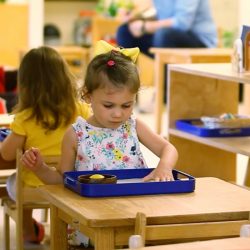“Education is a natural process spontaneously carried out by the human individual and acquired not by listening to words but by experiment upon the environment.”
Dr. Maria Montessori
About The Methodology

Through repetition, the child gains proficiency and can progress to more abstract or detailed work. Building on his own successes leads to the “life-long learner” that people hear so often of Montessori students. Conducive to the child’s efforts is the Montessori classroom, which is a calm and tranquil environment that respects the innate dignity of the child. The guide gives lessons for an activity in one of many areas. Children are free to choose work which satisfies and stimulates their interest. The work is designed to succeed with a logical series of steps, which builds inner discipline and success, since many of the self-correcting.
Respect is our foundation for learning and becoming contributing members of society. The Montessori approach is based on principles of freedom and limits within a prepared environment, which has a definite order. This encourages the child to develop at his own speed in a non-competitive atmosphere. Providing positive direction, the Montessori guide and parents realize the importance of allowing a child to develop in his own time and not along a pre-conceived timeline. This is the Montessori meaning of true freedom.

The Montessori approach succeeds because it draws its principles from the natural development of the child. The inherent flexibility allows the approach to adapt to the needs of the individual, regardless of the level of ability, learning style or social maturity.
montessori vs. conventional education
| Conventional | Montessori |
| Textbooks, pencil, paper and worksheets where teacher correct errors | Prepared kinesthetic materials that are self-correcting |
| Working and learning without emphasis on social development | Working and learning matched to the social development of the child |
| Group oriented, at groups pace or teachers pace | Individualized, at a level consistent with the child’s abilities |
| Teacher motivated | Motivated by self-development |
| Individual subjects | Integrated subjects and learning based on developmental psychology |
| Activity cycles determined by set time | Uninterrupted work cycles completed within child’s time |
| Single-graded classrooms | Multi-age classrooms (3 year age span) |
| All children treated alike | Recognition of individual sensitive periods |
| Teacher sets curriculum | Child chooses materials |
| Students fit mold of school | School meets needs of students |
| Teacher lectures | Hands-on learning: manipulating objects |
| Product-focused | Process-focused |
